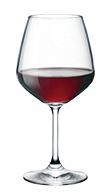
The holidays are right around the corner, and whether you’re hosting a big party or a small gathering, red wine will probably be on the menu. Today, wine has become a staple on the dinner table, and an indispensable part of a good meal. Many speculations have been made about the effects that red wine has on our health, and separating fact from fiction can prove to be a challenge.
We have all heard the saying “too much of anything is bad,” and this is certainly true. Although red wine has many benefits, it should be enjoyed in moderation as part of a healthy lifestyle. In general, alcohol consumption should be limited to no more than 2 standard drinks per day for women and to a maximum of 3 standard drinks per day for men.1
1 Standard Glass of Wine = 142 ml (5 oz) with 12% alcohol 2

Calories
Looking to get to or stay at a healthy weight? It’s important to be mindful of how much you’re drinking since liquid calories can add up quickly and are easier to disregard than food calories. In general, the calories in alcoholic beverages are said to be empty calories, as they have little to no nutritional value. For example, one standard glass of wine contains 123 to 127 calories and 1 to 4 grams of carbohydrates.1 For people with diabetes, consult a dietician to see how you can drink without compromising your blood glucose levels.
Benefits
To continue, scientists and researchers started to associate red wine consumption with good health due to the “French Paradox,” which describes the low incidence of cardiovascular disease in the French population despite a diet high in saturated fats. In fact, studies showed that the beneficial properties of red wine are mainly linked to a specific antioxidant called resveratrol.
Resveratrol has been associated with cardio-protective and anti-inflammatory properties. According to the American Heart Association, it may reduce the risk of heart attack or stroke by preventing platelets in the blood from sticking together, hence reducing clot formation. Similarly, resveratrol, along with other antioxidants in red wine such as quercetin and proanthocyanidines, may decrease LDL (bad) cholesterol levels and cause a 12% increase in HDL (good) cholesterol levels.3, 4 Moreover, studies have shown that moderate red wine consumption is associated with lower incidence of Alzheimer’s disease; possibly due to a protective effect resveratrol has on the brain.5
Finally, it is not recommended to start drinking red wine as a way to prevent heart disease. There are more effective ways to do that such as lowering your saturated and trans fat consumption, getting at least 30 minutes of daily exercise and losing any extra weight. However, if you already drink wine or plan on starting, keep it moderate and choose wisely! My suggestion would be a healthy pick of red wine such as Pinot Noir, as it has been shown to have the highest amount of resveratrol.
Happy holidays!
Jennifer Mikhael, P.Dt.
1 Canadian Diabetes Association. Alcohol and Diabetes. 2015. http://www.diabetes.ca/diabetes-and-you/healthy-living-resources/diet-nutrition/alcohol-diabetes
2 EatRight Ontario. Alcohol and Nutrition. 2015. https://www.eatrightontario.ca/en/Articles/Alcohol/Alcohol-and-Nutrition.aspx
3 T.S. Mohamed Saleem, S. Darbar Basha. Journal of Cardiovascular Disease Research. 2010. http://www.ncbi.nlm.nih.gov/pmc/articles/PMC3023893/
4 Szmitko PE, Verma S. Cardiology Patient Page: Red Wine and Your Heart. Circulation 2005. http://circ.ahajournals.org/content/111/2/e10.full
5 Vingtdeux, Valérie et al. Therapeutic Potential of Resveratrol in Alzheimer’s Disease. BMC Neuroscience 9.Suppl 2 (2008).
http://www.biomedcentral.com/1471-2202/9/S2/S6
How does red wine affect your health? is a post from Nautilus Plus. The Nautilus Plus blog aims to help people in their journey to fitness through articles on training, nutrition, motivation, exercise and healthy recipes.
Copyright © Nautilus Plus 2015


